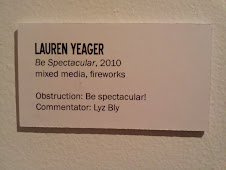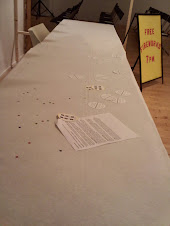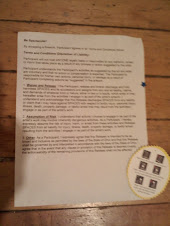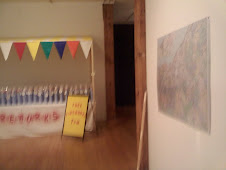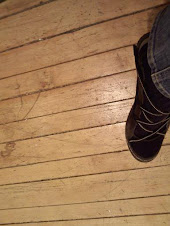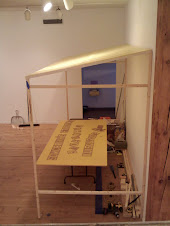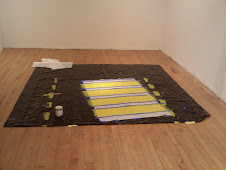I love yoga. I love the way I feel when I'm practicing it. I love going to the studio where I practice four or fives times a week, where I know at least a third of the people in the room at any given time/class. I love the teachers at my studio. I love that way the practice makes my body feel and look. I love teaching it and helping people along as they experience the practice for themselves, in their own beautiful, unique bodies. I've been practicing regularly for two years (and sporadically for even longer) and it's changed my life. It helps me keeps me calm and makes me happier, giving me a patience that I never thought I'd have.
I also love feminism and am an unabashed feminist and gender studies scholar. As I prepare to wrap up a six month yoga teacher training (YTT) program this weekend, I've been thinking a great deal about how these passions converge and diverge. Case in point: a few months ago the teacher/leader of my YTT program lectured on the mythical story to Rama, Seta, and Hanuman. Rama, the masculine figure, represents side of social or cultural side of humanity, and Seta, the feminine figure, represents the natural side of humanity. In the tale, Seta is banished from culture for an alleged sexual indiscretion, and Hanuman (the monkey), travels on Rama's behalf to reunite her with Rama. Hanuman is therefore the bridge between the natural and the cultural. After our teacher's lecture, one of my YTT colleagues commented that she was troubled that Seta--the feminine character--was banished. Another of my peers echoed these sentiments, saying something like, "Yeah, that didn't make the feminists in the room very happy" (I always love it when I [often the sole feminist/gender studies person in the room] am not the one who speaks up first). Our teacher (who is bright and fun and generally amazing) told us that we were reading too much into the story. But were we? Yoga and all of it's intricately complex traditions, as ancient as they are, was created by humans and reflects the social mores, ideals, and ideologies of the time(s). This said, it is wrought from patriarchal ideologies and power structures that are historically and contemporarily pervasive in culture.
Yoga is about "yoking," or uniting breath/prana and movement/asana, as well as uniting people and finding commonalities across gender, race, class, sexual identity, and a myriad of other individual experiences and realities. I have experienced this in ways that I never could have imagined, finding love and compassion for people I would never have imagined connecting with had it not been for yoga. These connections are very powerful and dear to me.
Yet, as a feminist, I am cognizant of the fact that many of the most famous contemporary yogis are men. Think Rodney Yee, Max Strom, and Rolf Gates, Baron Baptiste, and Bikram Choudhury, not to mention the godfathers of contemporary yoga like BKS Iyengar, Sri K. Pattabhi Jois, Sri T. Krishnamacharya, and Sri Swami Satchidananda, and rising yoga stars like Jonny Kest. There are famous women yogis, of course, including Lilias Folan, Shiva Rea, and Seane Corn, yet, given recent statistics on the gender of U.S. yoga practitioners--in 2008 72.2% of practicing yogis were female, 27.8% were male--the proportion of famous female yogis does not reflect the breakdown of yoga students/practitioners who regularly step on to their mats.* Moreover, while some cursory Internet research on the breakdown by gender of "ordinary" yoga teachers didn't provide solid statistics, it's clear (based on viewing numerous studio sites across the U.S.) that a majority of them are women.
This said, what should I--a Ph.D.-ed feminist historian/scholar and soon to be teacher of yoga--do about the imbalances inherent in the practical aspects of the practice? While conducting research for this post, I was happy to find that I am not the only woman yoga practitioner-lover to address its gendered dimensions (see for instance, yogasuzi's post from 2007-08 http://yogalikesalt.wordpress.com/2007/08/13/yoga-and-gender/).
Thoughts anyone?
*NAMASTA (North American Studio Alliance) provides 2008 statistics on yoga participation in the U.S., citing the Yoga in America Study (see http://www.namasta.com/pressresources.php#2).
Monday, March 15, 2010
Career Opportunities the Ones that [Always] Knock
Censored Letter to An Editor
Dear Eva,
I hope this email finds you well. I am writing to let you know that I've been unable to get the book proposal for Pop Culture: A History to you by the deadline that we established back in January. I am teaching five courses this semester and the workload surpassed my expectations. I am still interested in working on the revised edition of this text, however, I need more time to get my proposal together. I'd like to suggest moving the deadline to April 15. If this won't work for you and you need to find someone else to take on the project, I completely understand.
My apologies; please let me know your thoughts on this.
Thank you again for everything --
Best,
Lyz
Uncensored Letter to An Editor
Dear Eva,
I hope this email finds you well. I am writing to let you know that I've been unable to get the book proposal for Pop Culture: A History to you by the deadline that we established back in January. I am teaching five courses this semester and the workload surpassed my expectations. While I love teaching, and worked my ass off to earn a Ph.D., I am feeling stretched to my limit by more than 100 students who are spread across three campuses. In addition to the usual class preparation and grading, this semester I have a particularly difficult group of students in one of my women's studies classes. This situation requires that I plan additional conflict mediation activities and hold meetings before and after class with students who have significant mental and emotional disorders.
I must consider myself fortunate to have these five teaching gigs, as I have no idea how I am going to earn money over the summer. As an adjunct instructor there is no job security, nor do I get paid year-round like my colleagues who were fortunate enough to get tenure-track jobs in an era when such academic jobs existed. (I recognize that, according to American Historical Association data, my chances of getting such a job are four in ten.) Because of my situation, I must constantly search for work for the coming semester while teaching during the current one.
Ultimately, I realize that I may be screwing myself by risking this opportunity that you've given me--to revise another scholar's work for little or no pay. Despite my accomplishments and sacrifices (my family is nearly $200,000 in debt--in part because I only worked part time in the 6.5 years it took me to earn my Ph.D.), I know that I need any and all publishing opportunities, otherwise I am unmarketable as a scholar.
In addition to my work responsibilities, I must also care for my family of one spouse, two children (five and 18), two dogs, and three cats. Shopping and cooking for this brood is itself a full-time job. I'm not much of a cleaner (my spouse, fortunately, is), however, there are ever-growing piles of laundry scattered throughout my house at all times. Now that the weather is getting nicer in Cleveland, there will be the additional pressure to garden, clean up the yard (including the roughly 150 lbs. of dog shit that's been hidden under snow and ice for five months), put screens in the windows, and help my spouse repair the siding that fell off of our dilapidated home during one of the ten snow and wind storms the house endured this winter.
Of course, I must look good doing all of these activities, which means that I have to schedule regular appointments for hair cuts, purchase and coordinate clothes for my daughter and me (my son and spouse thankfully take care of their own waredrobes), and make sure that all hair on my body is appropriately managed by tweasing or waxing (though I must admit that I don't wax and refuse to shave my legs, which fulfills the stereotypes of many of my students who assert that all feminists are hairy and angry).
To be a good teacher and "respectable" academic, I must keep updated on news and current events, so I "relax" by watching news shows and reading political and feminist blogs. As a vegan and someone who is concerned with the environment, I also must keep up to date on what products are green and do not contain animal ingredients.
Amid all of these responsibilities, I do make it to yoga four to five times a week and, because there are no academic jobs, I am becoming certified to teach yoga to earn extra money. This is the one thing that I truly do for myself. I suppose I could take these six or eight hours this week and put them toward finishing the book proposal, but if I did that, I would probably be too stressed to work anyway. This unstructured time would also provide time for my guilt over the lack of "alone" time and my husband and I spend together to arise, because, along with our busy work schedules, we are unconditional parents, which means that our five-year-old daughter co-sleeps with us.
Having said all this, I should say that I am still interested in working on the revised edition of this text. However, I need more time to get my proposal together. I'd like to suggest moving the deadline to April 15, 2020. If this won't work for you and you need to find someone else to take on the project, I completely understand.
My apologies; please let me know your thoughts on this.
Thank you again for everything --
Best,
Lyz
Dear Eva,
I hope this email finds you well. I am writing to let you know that I've been unable to get the book proposal for Pop Culture: A History to you by the deadline that we established back in January. I am teaching five courses this semester and the workload surpassed my expectations. I am still interested in working on the revised edition of this text, however, I need more time to get my proposal together. I'd like to suggest moving the deadline to April 15. If this won't work for you and you need to find someone else to take on the project, I completely understand.
My apologies; please let me know your thoughts on this.
Thank you again for everything --
Best,
Lyz
Uncensored Letter to An Editor
Dear Eva,
I hope this email finds you well. I am writing to let you know that I've been unable to get the book proposal for Pop Culture: A History to you by the deadline that we established back in January. I am teaching five courses this semester and the workload surpassed my expectations. While I love teaching, and worked my ass off to earn a Ph.D., I am feeling stretched to my limit by more than 100 students who are spread across three campuses. In addition to the usual class preparation and grading, this semester I have a particularly difficult group of students in one of my women's studies classes. This situation requires that I plan additional conflict mediation activities and hold meetings before and after class with students who have significant mental and emotional disorders.
I must consider myself fortunate to have these five teaching gigs, as I have no idea how I am going to earn money over the summer. As an adjunct instructor there is no job security, nor do I get paid year-round like my colleagues who were fortunate enough to get tenure-track jobs in an era when such academic jobs existed. (I recognize that, according to American Historical Association data, my chances of getting such a job are four in ten.) Because of my situation, I must constantly search for work for the coming semester while teaching during the current one.
Ultimately, I realize that I may be screwing myself by risking this opportunity that you've given me--to revise another scholar's work for little or no pay. Despite my accomplishments and sacrifices (my family is nearly $200,000 in debt--in part because I only worked part time in the 6.5 years it took me to earn my Ph.D.), I know that I need any and all publishing opportunities, otherwise I am unmarketable as a scholar.
In addition to my work responsibilities, I must also care for my family of one spouse, two children (five and 18), two dogs, and three cats. Shopping and cooking for this brood is itself a full-time job. I'm not much of a cleaner (my spouse, fortunately, is), however, there are ever-growing piles of laundry scattered throughout my house at all times. Now that the weather is getting nicer in Cleveland, there will be the additional pressure to garden, clean up the yard (including the roughly 150 lbs. of dog shit that's been hidden under snow and ice for five months), put screens in the windows, and help my spouse repair the siding that fell off of our dilapidated home during one of the ten snow and wind storms the house endured this winter.
Of course, I must look good doing all of these activities, which means that I have to schedule regular appointments for hair cuts, purchase and coordinate clothes for my daughter and me (my son and spouse thankfully take care of their own waredrobes), and make sure that all hair on my body is appropriately managed by tweasing or waxing (though I must admit that I don't wax and refuse to shave my legs, which fulfills the stereotypes of many of my students who assert that all feminists are hairy and angry).
To be a good teacher and "respectable" academic, I must keep updated on news and current events, so I "relax" by watching news shows and reading political and feminist blogs. As a vegan and someone who is concerned with the environment, I also must keep up to date on what products are green and do not contain animal ingredients.
Amid all of these responsibilities, I do make it to yoga four to five times a week and, because there are no academic jobs, I am becoming certified to teach yoga to earn extra money. This is the one thing that I truly do for myself. I suppose I could take these six or eight hours this week and put them toward finishing the book proposal, but if I did that, I would probably be too stressed to work anyway. This unstructured time would also provide time for my guilt over the lack of "alone" time and my husband and I spend together to arise, because, along with our busy work schedules, we are unconditional parents, which means that our five-year-old daughter co-sleeps with us.
Having said all this, I should say that I am still interested in working on the revised edition of this text. However, I need more time to get my proposal together. I'd like to suggest moving the deadline to April 15, 2020. If this won't work for you and you need to find someone else to take on the project, I completely understand.
My apologies; please let me know your thoughts on this.
Thank you again for everything --
Best,
Lyz
Saturday, March 13, 2010
[In]Visible Labor
My friend Cindy Penter curated an exhibition, "Referential: Homage. Montage. Sabotage.," which opened last night at Asterisk Gallery http://www.asteriskgallery.com/in Tremont. Lots of amazing artists/work in the show of video installations, including pieces by my spouse and many of my feminist friends. My spouse, daughter, and I went to the gallery on Thursday night to drop off an artist statement and witnessed the chaos that typically accompanies the eve of an art opening. As a former curator, gallery director, and art museum worker, I know the feeling very well. Artworks still need to be installed and lit, title wall signage and labels need to be hung (often still need to be written), and then there's the occasional artist who shows up at the eleventh hour demanding the prime wall space that's already been assigned to someone whose work is exceptional, or who has been there for the past three nights volunteering their time patching and painting walls. In the midst of all of this, the gallerist knows that the bathroom still needs to be cleaned, the pre-cut, pre-washed carrots, humus, chip and salsa, not to mention the beer and wine, still need to be purchased for the next day's opening reception. It's exhausting. I am longer an art worker/gallerist and this is the kind of work and drama I don't miss.
Curators and gallerists (in small art venues like Asterisk) stay up all night making all of this happen and on opening day, hordes of people walk into a pristine space with art seamlessly hung on freshly painted walls. Well-designed signage greets them. Carefully written and edited artist statements are there to explain the work to them. Snacks and cheap or free drinks are there for the taking. The artists arrive and their work looks better than even they imagined under the lights, on the pedestals, and against the stark walls. The work it takes to put an exhibition together is invisible to everyone except to those who do it. Like parenting, it's often thankless labor.
While I don't miss this part of the art world, I do miss writing about art. I wrote art criticism for a number of years, primarily at the now defunct Free Times. During those years, I'd walk into a pristine space, pen and paper in hand, and evaluate the show and the work. I was good at what I did, yet, even though there were years where I was also gallery director at Lake Erie College (which meant I was the curator, art installer, publicist, and fundraiser), I sometimes took the invisible labor that goes along with mounting an art exhibition for granted when I donned the role of critic. Being at Asterisk the other night reminded me of this work and of the times that I, the "art critic," contributed to obscuring it.
For the times I forgot (or ignored) the fact of this labor, my apologies (Dana).
Next time you go to an art opening, thank the gallerist. Better yet, offer to serve the drinks or replenish the snack table so that s/he can have a beer... or a catnap.
Curators and gallerists (in small art venues like Asterisk) stay up all night making all of this happen and on opening day, hordes of people walk into a pristine space with art seamlessly hung on freshly painted walls. Well-designed signage greets them. Carefully written and edited artist statements are there to explain the work to them. Snacks and cheap or free drinks are there for the taking. The artists arrive and their work looks better than even they imagined under the lights, on the pedestals, and against the stark walls. The work it takes to put an exhibition together is invisible to everyone except to those who do it. Like parenting, it's often thankless labor.
While I don't miss this part of the art world, I do miss writing about art. I wrote art criticism for a number of years, primarily at the now defunct Free Times. During those years, I'd walk into a pristine space, pen and paper in hand, and evaluate the show and the work. I was good at what I did, yet, even though there were years where I was also gallery director at Lake Erie College (which meant I was the curator, art installer, publicist, and fundraiser), I sometimes took the invisible labor that goes along with mounting an art exhibition for granted when I donned the role of critic. Being at Asterisk the other night reminded me of this work and of the times that I, the "art critic," contributed to obscuring it.
For the times I forgot (or ignored) the fact of this labor, my apologies (Dana).
Next time you go to an art opening, thank the gallerist. Better yet, offer to serve the drinks or replenish the snack table so that s/he can have a beer... or a catnap.
For "Maria"
The first time I saw her, it was already apparent—that unyielding look of stubborn determination. I didn’t become her mother until she was four months old, and by the time I first saw her face animated—on a 30 second video clip that I received via email—she’d already learned to make it, learned to hold it. It was an expression that told the world that she was in control, even though her 19-year-old, desperately poor, birth mother had given her up, courageously signed her life over to strangers. As I watched the video of my daughter—then called “Maria” after her biological mother—I searched her face for signs of distress and detachment; the former emotion was absent, but the latter was apparent. In an attempt to make the infant adoptee smile for her American parents, the Guatemalan adoption worker held her above her shoulders, lifting my daughter lightly up and down, up and down. Maria’s expression didn’t change for the first 29 seconds, making me nervously wonder what challenges were ahead, how I would breach her impenetrable façade. Though, in the last second, a look faintly flashed across her face—the corners of her mouth turned up very slightly, her eyes softened. It was nowhere near a smile, but simply a vague indication that she was capable of letting go, of letting someone in.
At almost six years of age, my child now laughs easily; she also readily dons the opaque mask that she conjured in her first months of life. It took years for her to volunteer her affections to her grandparents, cousins, and aunts and uncles. She is sensitive, her feelings are readily hurt. Emotional infractions are declared without warning, often for inexplicable reasons. She is nonetheless delightful, as, while her attachment to us came gradually, when it came the bonds were strong and deep.
I envision her returning to Guatemala someday, traversing the ground on which her mother walked when she was pregnant—when they were both “Maria.” I think of how her resolute nature will serve her if she travels those roads and sees the poverty and desperation of a people whose history is fraught with centuries of colonialism and oppression. I wonder how my mothering of this child fits into this history. Have I colonized her mind and body, making an “American” out of her?
Sometimes on days when she’s difficult—when she’s defiant, angry, and even hateful—I think of her ancestors and imagine that they are releasing an infinitesimal fraction of six hundred years of collective pain and angst over their past through this Guatemalan-American girl. Then, I come back to the moment and give her want she wants. And love her madly.
Friday, March 12, 2010
Rebel Girl You Are The Queen Of My World
My friend's mom died unexpectedly last week. This friend is a bad-ass, super-smart feminist--the kind of woman you want by your side when you're walking down the street on a cold dark night, or when you're arguing about abortion/reproductive rights with someone who's adamantly anti-choice (or frustratingly ambivalent about the issue), or, when you're shaking with fear, facing an enormous personal challenge (she was in the room the day I defended my dissertation).
The news about her mother came via Facebook. I waited a couple of days before I called. What do you say? It's her mom. There are no words for this; I ask about funeral services--her mom requested that none be held. "I think I'm coming to the consciousness-raising meeting on Sunday," she says. "Great, I can't wait to see you," I reply. "Let me know if you need anything...love you." A few more short exchanges. We hang up.
I can't know what she's feeling. Can't even fathom it. But she keeps busy. Keeps posting biting commentary on race and gender on Facebook. Writes a "call for entries" piece for an online journal about an upcoming performance project (on motherhood, nonetheless) that she began conceptualizing/planning before her mother's death. Finishes a video work and installs it in a gallery. Attends the opening reception. All while dealing with the drama that always unfolds amid the worst family crises.
My friend is one of a kind in many ways, but she is like so many of the women in my life. We don't stop. Can't stop. Are always doing, creating, saving the damn day. Practically, we rule. Structurally, we're at the mercy of a millenia-old patriarchal system that is perpetuated by images and texts that exist to put/keep us in our place. Disney princesses, MTV's "Jersey Shore," video "hoes," "reality" shows like "The Bachelor," airbrushed fashion photography, pornography, anti-choice murderers, serial killers, domestic violence perpetrators, rapists, and misogynists like Rush Limbaugh and Howard Stern.
I want a television show with my friend as star, director, and producer. About a real woman who picks herself up on the worst fucking week of her life, and continues to work on important, creative projects. She might break down under the sadness and stress by the end of the season, but I know at least fifty women who would be there to lift her up and pick up the slack if that happened. And not just to get on TV.
The news about her mother came via Facebook. I waited a couple of days before I called. What do you say? It's her mom. There are no words for this; I ask about funeral services--her mom requested that none be held. "I think I'm coming to the consciousness-raising meeting on Sunday," she says. "Great, I can't wait to see you," I reply. "Let me know if you need anything...love you." A few more short exchanges. We hang up.
I can't know what she's feeling. Can't even fathom it. But she keeps busy. Keeps posting biting commentary on race and gender on Facebook. Writes a "call for entries" piece for an online journal about an upcoming performance project (on motherhood, nonetheless) that she began conceptualizing/planning before her mother's death. Finishes a video work and installs it in a gallery. Attends the opening reception. All while dealing with the drama that always unfolds amid the worst family crises.
My friend is one of a kind in many ways, but she is like so many of the women in my life. We don't stop. Can't stop. Are always doing, creating, saving the damn day. Practically, we rule. Structurally, we're at the mercy of a millenia-old patriarchal system that is perpetuated by images and texts that exist to put/keep us in our place. Disney princesses, MTV's "Jersey Shore," video "hoes," "reality" shows like "The Bachelor," airbrushed fashion photography, pornography, anti-choice murderers, serial killers, domestic violence perpetrators, rapists, and misogynists like Rush Limbaugh and Howard Stern.
I want a television show with my friend as star, director, and producer. About a real woman who picks herself up on the worst fucking week of her life, and continues to work on important, creative projects. She might break down under the sadness and stress by the end of the season, but I know at least fifty women who would be there to lift her up and pick up the slack if that happened. And not just to get on TV.
Subscribe to:
Comments (Atom)
